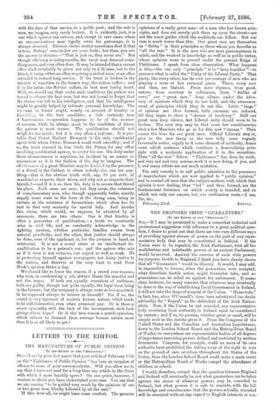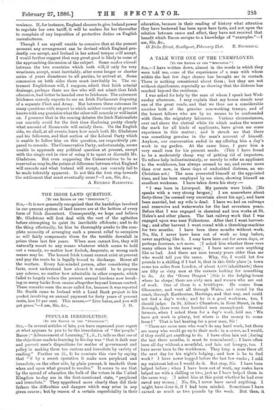THE PROPOSED IRISH "GUARANTEES."
ITo THE EDITOR OF THE "SPECTATOR."]
I may be permitted to make a somewhat technical and professional suggestion with reference to a great political ques- tion, I desire to point out that there are two very different ways of providing against abuses of power on the part of any repre- sentative body that may be constituted in Ireland. If the Union were to be repealed, the Irish Parliament, with all the multifarious and indefinable powers of an ancient Parliament, would be revived. Against the exercise of such wide powers for purposes hostile to England, I think you have clearly shown that all " Guarantees " would be illusory. It would, I may add, be impossible to foresee, when the guarantees were accepted, what directions hostile action might thereafter take, and no guarantees can be relied on against the unforeseen. It seems clear, however, for many reasons, that whatever may eventually be done in the way of establishing Local Government in Ireland, it will not take the shape of a repeal of the Union. "Rome-rule," in fact, has, since O'Connell's time, been substituted (no doubt advisedly) for "Repeal," as the shibboleth of the Irish Nation- alists. Now, if the Union be not repealed, any representative body exercising local authority in Ireland must be constituted by statute ; and if so, its powers, whether great or small, will be simply such as the statute gives it. From the Congress of the United States and the Canadian and Australian Legislatures, down to the London School Board and the Metropolitan Board of Works, we everywhere see representative bodies of all degrees of importance exercising powers defined and restricted by written documents. Congress, for example, could no more of its own authority have prohibited the taking away of the right to vote on the ground of race or colour throughout the States of the Union, than the London School Board could make a main sewer or the Metropolitan Board of Works compel the attendance of children at school.
I would, therefore, submit that the question between England and Ireland will eventually be, not what guarantees can be taken against the abuse of whatever powers may be conceded to Ireland, but what powers it is safe to concede, with the fall knowledge and consciousness that the powers actually conceded will be exercised without any regard to English interests or con- venience. If, for instance, England chooses to give Ireland power to regulate her own tariff, it will be useless for her thereafter to complain of any imposition of protective duties on English manufactures.
Though I am myself unable to conceive that at the present moment any arrangement can be devised which England pru- dently can accept, and Ireland in her actual temper will accept, I would further suggest that very great good is likely to come of the approaching discussion of the subject. Some mocha vivendi between the two countries which both will, if only for very weariness, accept, must inevitably, after some longer or shorter series of years disastrous to all parties, be arrived at. Some concession on both sides there must inevitably be. The ex- tremest Englishman will, I suppose, admit that Irish arterial drainage, perhaps there are few who will not admit that Irish education, had better be handed over to Irishmen. The extremest Irishman scarcely expects to see an Irish Parliament disposing of a separate Fleet and Army. But between these extremes lie many questions with respect to which neither country at present knows with any precision what the other will concede or will insist on. I presume that in the coming debates the Irish Nationalists can scarcely avoid for the first time disclosing pretty clearly what amount of Home-rule will satisfy them. On the English side, we shall, at all events, learn how much both Mr. Gladstone and his followers, and that section of the Liberal Party which is unable to follow him on this question, are respectively pre- pared to concede. The Conservative Party, unfortunately, seems unable to approach any political question at present, except with the single end in view of using it to upset or discredit Mr. Gladstone. But even supposing the Conservatives to be as reserved as maybe, the points of difference between what England will concede and what Ireland will accept, can scarcely fail to be made tolerably apparent. Is not this the first step towards the settlement that must eventually come P—I am, Sir, &c.,
A RETIRED BARRISTER..



































 Previous page
Previous page